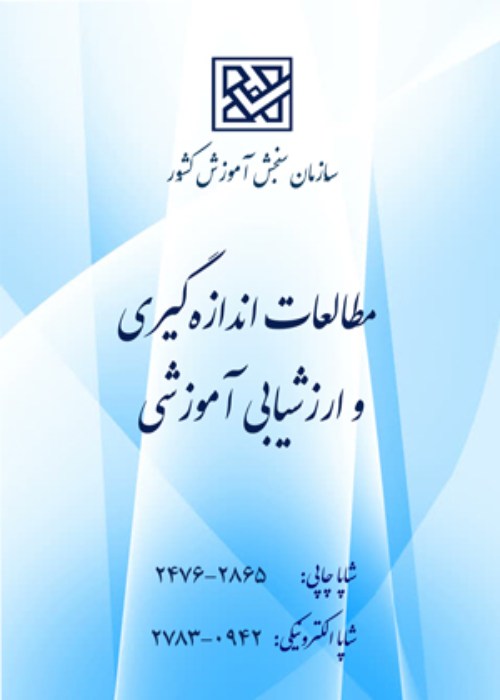Identification of Components of Ethics of Evaluation in Higher Education from the Faculty Members’ Viewpoints and Its Application from Students' Perspectives
Author(s):
Article Type:
Research/Original Article (دارای رتبه معتبر)
Abstract:
The aim of the present study was to identify the components of ethics of evaluation in higher education from the faculty members’ viewpoints and its application from students' perspectives. A mixed-method (sequential exploratory) approach focusing on qualitative and quantitative methods was used in the research. The research was conducted in a descriptive-survey design. The participants of the qualitative section were composed of faculty members of Azarbaijan Shahid Madani University and the statistical population of the quantitative section was consisted of MA/MSc and BA/BSc students of Azarbaijan Shahid Madani University (N=6065). Accordingly, 16 faculty members were selected and interviewed via the purposive sampling method. In addition, 362 Students were selected using the proportionate stratified random sampling method. The tool used for the qualitative section was semi-structured interviews technique and the quantitative tools were a Researcher-Made Ethics of Evaluation, which was composed of 34 items. Regarding the data analysis, it was tried to make use of qualitative content analysis (conventional type) for qualitative section and one-sample T-test and Independent T-test were used for the quantitative section. The qualitative findings were categorized into 6 components identified as ethics of evaluation. The quantitative results showed that the application of the component of effective communication in favorable evaluation as well as components of unbiased evaluation, ethical considerations in evaluation and reliability and validity of evaluation instruments were rated lower than the hypothetical mean from MA/MSc students’ viewpoint. Moreover, given the BA/BSc students’ perspective, the components of evaluation as learning, principled and correct evaluation and effective scientific communications in the favorable evaluation were reported. Regarding the difference in the application of components of ethics of evaluation between female and male students, the results indicated that there was a significant difference in such components as unbiased evaluation, effective scientific communications, and the reliability and validity of the evaluation instruments but no difference was observed in other components. The ethical system in higher education, especially in student’s evaluation, reflected professional-scientific behaviors and the sense of ethical commitment on the part of professors.
Keywords:
Language:
Persian
Published:
Journal of Measuring and Educational Evaluation Studies, Volume:8 Issue: 24, 2019
Pages:
57 to 83
magiran.com/p1943294
دانلود و مطالعه متن این مقاله با یکی از روشهای زیر امکان پذیر است:
اشتراک شخصی
با عضویت و پرداخت آنلاین حق اشتراک یکساله به مبلغ 1,390,000ريال میتوانید 70 عنوان مطلب دانلود کنید!
اشتراک سازمانی
به کتابخانه دانشگاه یا محل کار خود پیشنهاد کنید تا اشتراک سازمانی این پایگاه را برای دسترسی نامحدود همه کاربران به متن مطالب تهیه نمایند!
توجه!
- حق عضویت دریافتی صرف حمایت از نشریات عضو و نگهداری، تکمیل و توسعه مگیران میشود.
- پرداخت حق اشتراک و دانلود مقالات اجازه بازنشر آن در سایر رسانههای چاپی و دیجیتال را به کاربر نمیدهد.
In order to view content subscription is required
Personal subscription
Subscribe magiran.com for 70 € euros via PayPal and download 70 articles during a year.
Organization subscription
Please contact us to subscribe your university or library for unlimited access!


